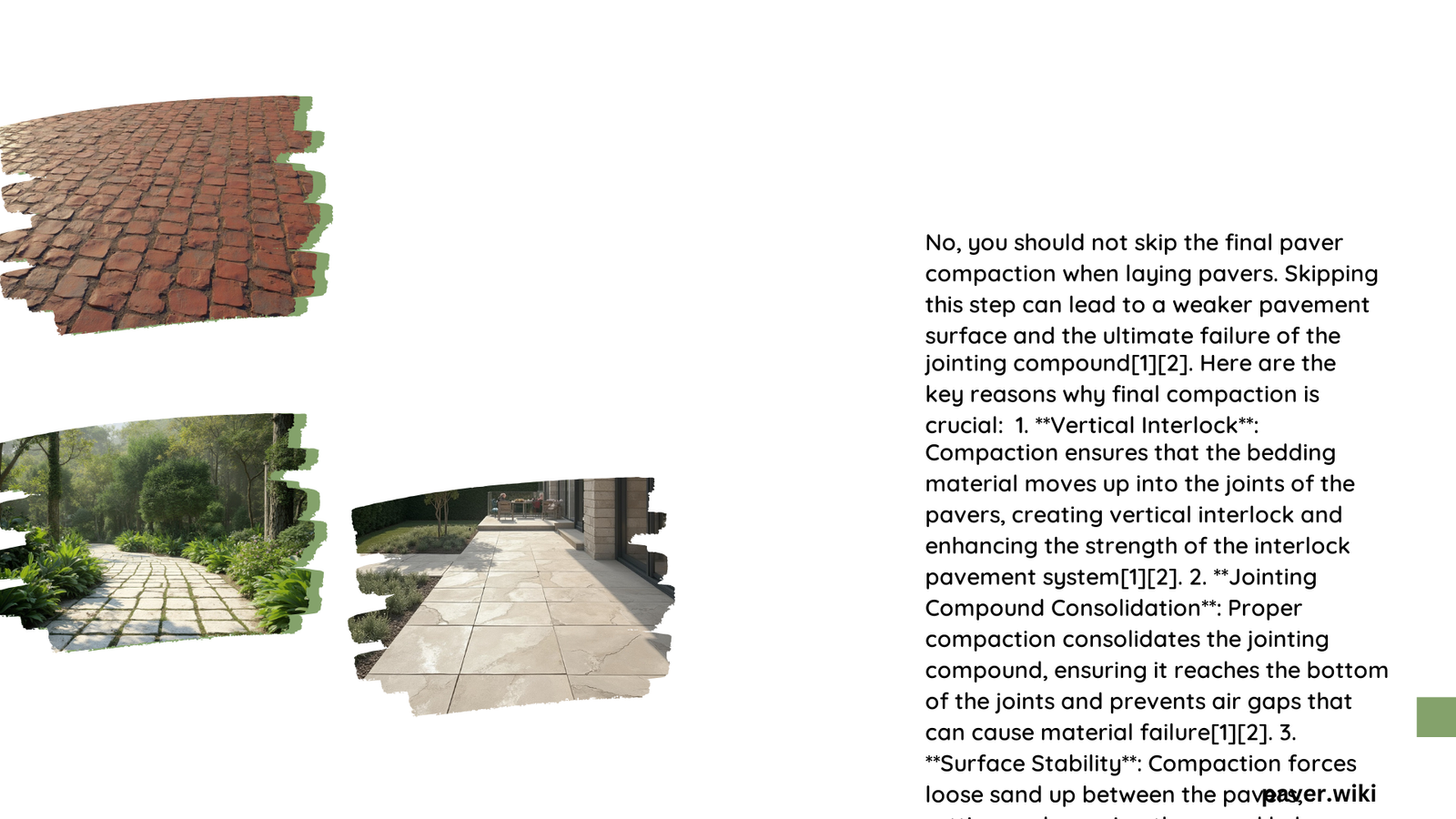Skipping the final paver compaction when laying pavers is not recommended. This crucial step ensures the longevity and stability of your paver installation. Proper compaction seats the pavers into the bedding material, consolidates the jointing compound, and initiates vertical interlock. Without this final step, your pavement may experience premature failures, settling, and reduced lifespan. Let’s explore why final compaction is essential and the consequences of skipping it.
Why is Final Paver Compaction Important?
Final paver compaction plays a vital role in the overall stability and durability of your paver installation. Here are the key reasons why it’s crucial:
- Seating Pavers: Compaction ensures that pavers are firmly seated into the bedding material.
- Joint Consolidation: It helps consolidate the jointing compound into the gaps between pavers.
- Vertical Interlock: The process initiates the vertical interlock of the interlocking concrete pavement system.
- Load Distribution: Proper compaction enables effective load transfer from one paver to another.
- Preventing Settlement: It minimizes the risk of future settling and the formation of low spots.
What Happens if I Skip Final Paver Compaction?

Skipping the final compaction step can lead to several issues:
- Pavement Failure: The jointing compound and interlocking system may fail, leading to instability.
- Settling and Rutting: Uneven surfaces can develop, especially in high-traffic areas.
- Reduced Lifespan: The pavement may experience premature distress and a shortened lifespan.
- Cracking and Breaking: Pavers may shift, crack, or break due to inadequate support.
- Increased Maintenance: More frequent repairs and maintenance will be necessary.
How Should I Perform Final Paver Compaction?
To ensure proper final compaction, follow these best practices:
- Use appropriate compaction equipment (plate compactor or roller).
- Make multiple passes to ensure thorough consolidation.
- Compact immediately after laying pavers and applying jointing compound.
- Use protective pads for sensitive pavers to prevent damage.
- Ensure the base material is properly compacted before laying pavers.
What Factors Affect Paver Compaction?
Several factors can influence the compaction process:
| Factor | Impact on Compaction |
|---|---|
| Paver Type | Different materials require specific compaction techniques |
| Soil Conditions | Base material and soil type affect compaction effectiveness |
| Weather | Temperature and moisture levels can impact compaction results |
| Equipment | Proper tools are essential for effective compaction |
| Expertise | Skilled application ensures optimal results |
What Are the Cost Implications of Skipping Final Paver Compaction?
While skipping compaction may seem like a cost-saving measure, it can lead to significant expenses in the long run:
- Increased Repair Costs: Premature failures will require costly repairs or replacements.
- Higher Maintenance Expenses: More frequent maintenance will be necessary to address issues.
- Shortened Lifespan: The pavement may need to be replaced sooner than expected.
- Property Value Impact: Poor paver installation can negatively affect property value.
Can Different Types of Pavers Skip Compaction?
No, all types of pavers benefit from proper compaction. However, the approach may vary:
- Concrete Pavers: Require standard compaction techniques.
- Natural Stone: May need specialized equipment to prevent damage.
- Clay Pavers: Often require careful compaction to avoid chipping.
- Permeable Pavers: Need specific compaction methods to maintain permeability.
What Are Common Mistakes in Paver Compaction?
Avoid these common errors during the compaction process:
- Insufficient passes with the compactor
- Using the wrong type of compaction equipment
- Compacting when the base material is too wet or dry
- Neglecting to compact the base material properly
- Over-compacting, which can damage pavers
In conclusion, skipping the final paver compaction when laying pavers is not advisable. This crucial step ensures the longevity, stability, and performance of your paver installation. By following proper compaction techniques and understanding its importance, you can create a durable and attractive paved surface that will stand the test of time.
References:
1. https://www.youtube.com/watch?v=iQS09AZ5900
2. https://www.revolutionarygardens.com/the-importance-of-compaction-for-installing-a-paver-driveway/
3. https://www.etc-web.com/press/resources/pavement-101-compaction/
